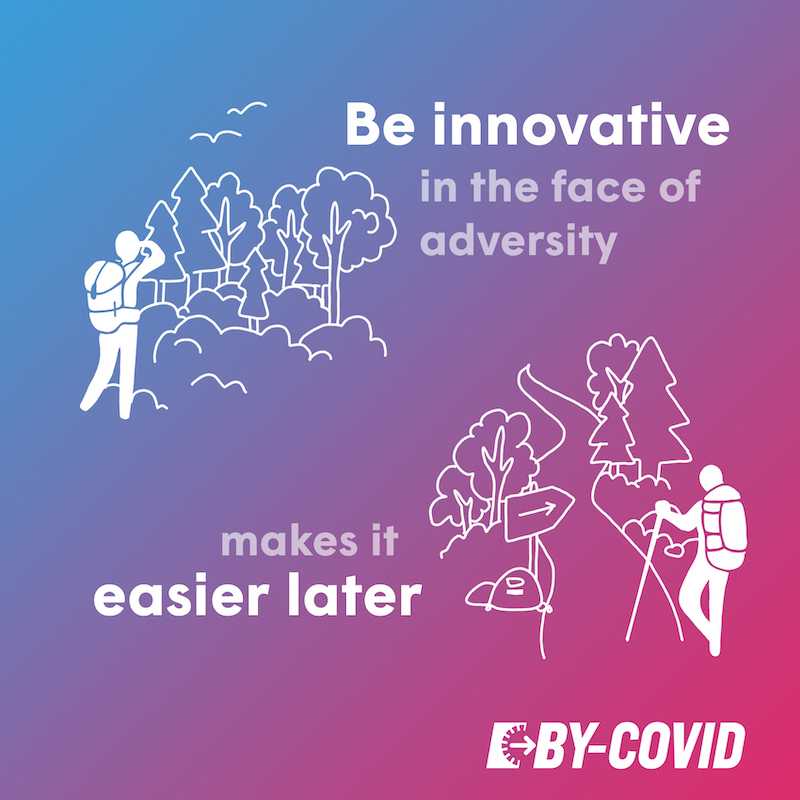
Creating paths for the future
The Covid-19 pandemic has upset our lives, but it has also transformed the world of research. Scientists from all over the world came together to understand the disease and develop treatments and vaccines as quickly as possible. But what happens to these advances once the crisis is over?
SCIENCE AS EXPLORATION
Explorers go on expeditions to discover unknown areas of our world. They may be looking for a new species of fungus with medicinal properties or trying to observe novel animal behaviour. Most will find their way using tried and tested tools, such as GPS, along with the ability to innovate in the face of unknown situations. Once the pioneers have found a way through the wilderness, their experience allows future travellers to follow more easily in their footsteps. The danger of getting lost, getting stuck in dangerous situations or wasting time searching, is much lower when the terrain has already been mapped out. The more the path is used, the better it will be marked out and the easier it will be to access. It would be a pity to leave these routes abandoned when we know they can lead to interesting places.
EXPLORING INFECTIOUS DISEASES
The pandemic is not the first, nor the last we will face. However, we will be better able to anticipate future pandemics thanks to the knowledge and experience gained throughout Covid-19. Just like exploration, prior research and experiences are very useful as a basis for further work.
Now that the pandemic is more under control, there is time to look back at lessons learnt and how these can be applied in future. We can use these learning to accelerate pandemic response efforts, for example optimising vaccine production. The research carried out, the results found, the procedures developed and the methods used can be used to prevent or manage future pandemics.
One of the most effective weapons against the Covid-19 virus was the rapid sharing of data from all over the world. The data showed how the disease affected the body, which measures were most effective in stopping transmission, how the virus was evolving and the best vaccines to prevent infections.
BEYOND COVID
Like explorers, scientists led the way in collecting, linking, storing, using and sharing data to help combat the pandemic. Covid-19 caused a worldwide crisis, and the scientific pioneers had to work rapidly and innovatively, for example to ensure all ethical and legal frameworks were in place and find new ways to connect data. This work under pressure showed the benefit of making data across countries and research areas available to everyone.
Some data infrastructures were created specifically to resolve this crisis, but proved to be so useful that now it’s important to make sure they are maintained. The BY-COVID project is following in the steps of the pandemic scientists to build maps, guides, bridges and stepping stones to mitigate and manage future pandemics.
Remember the toughest challenge you ever faced? Like studying for your exams or training for a marathon? Did you learn things from these achievements that proved useful for other challenges? What do you think the main lessons learned about data were during the pandemic?
IF YOU WANT TO KNOW MORE…
An example of a good health data infrastructure (Denmark): Health data and registers - Sundhedsdata Styrelsen
Review of the molecular and cellular determinants of critical COVID-19 pneumonia : Human genetic and immunological determinants of critical COVID-19 pneumonia | Nature
A look back at the lessons learned from the pandemic: Ten lessons from the first two years of COVID-19 | McKinsey
An example of a lesson learned from understanding Covid-19 (knowing how to use all the data involved): Why the WHO took two years to say COVID is airborne
What COVID-19 has taught us: “Healthcare can no longer exist without technology” | Africa Renewal
The BY-COVID framework reused for monkeypox: Repurposing COVID-19 pipelines for the monkeypox virus
Digital health during the pandemic and how to use it afterwards: Data capture and sharing in the COVID-19 pandemic: a cause for concern - The Lancet Digital Health
What covid has shown us about the importance of data sharing and open science: https://www.researchgate.net/profile/Kenneth-Zheng-2/publication/343892070_Data_sharing_during_COVID-19_pandemic_what_to_take_away/links/5f87cf9b458515b7cf81eda9/Data-sharing-during-COVID-19-pandemic-what-to-take-away.pdf